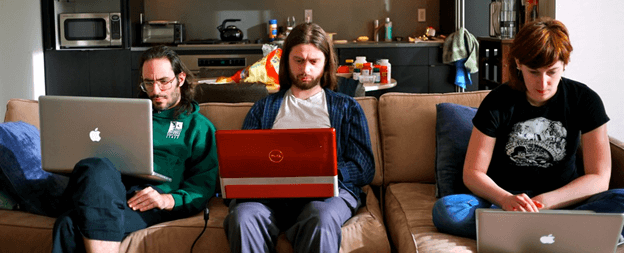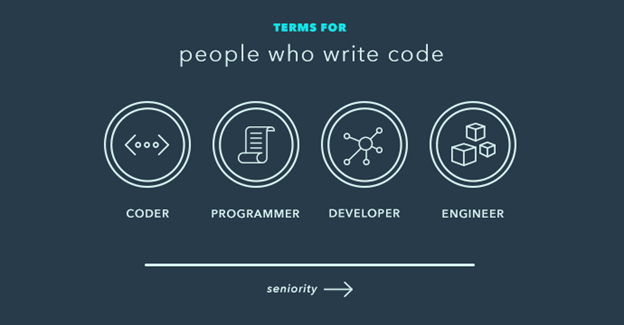Computer programmers are a different type of species who know how to count from zero and also know the importance of caffeine. As you have witnessed until now from Livecoding.tv, a computer programmer can have different habits attached to them. They also understand computers on a much deeper level and know things that an average person would never know.
Alexy Radul, MIT, published an article on his programming habits. It is an intriguing read for anyone who is into programming. For everyone else, we have to look at the habits at a different angle. Not everyone wants to get wrapped up into the computer science lingo.
So, where does an average person stands?
An average person knows computer as a device capable of doing a task. The task can be as simple as browsing the internet or as complicated as excel sheet calculations. Beyond this point, an average person can find themselves in a void, trying to understand the matrix of zeroes and ones.
The article is aimed at anyone who wants to know stuff that only computer programmers know and their unique habits. Do they view the world from a different periscope and what makes their habits so unique? Let’s find out.
1. A good (and long) playlist is one of the ingredients for success for the computer programmers.
If you’ve hung around Livecoding.tv for five minutes, you will recognize that a lot of streamers keep a running playlist of their favorite songs. Listening to songs is not new. Even programmers at Facebook and other big companies have their unique playlist for programming. So, what makes it so unique? Coding, for long hours, can be a daunting task. Listening to songs can keep you energized and focused for the whole coding session.
Want to share your playlist? Then, don’t forget to share it in the comment section. We will be creating an ultimate playlist and release it for the community.

2. For the Programmer, the average 9 to 5 is 9 to 3 am the next morning.
Developing a product is not at all easy. Time flies during coding sessions and debugging just makes it never ending process. For many software architects, time is not a concern. The only concern is the quality of their work and how they impact the society as a whole. Most of the streamers on Livecoding.tv know the impact of technology on the society and its ability to move it forward.
The unique feeling of building something from the ground up makes time insignificant. The following thought process best describes the never ending process.
“Let me just fix this one code; then I’ll take a break.”
“Okay, this next one, and then, I’ll go…”
“Wait why is that showing there? Better sort this out now!”

3. Coffee is an essential form of sustenance.
When you’re going non-stop, you tend to develop a tightly knit bond with coffee. Computer programmers have come to believe that coffee and fast food are life sustainer for them. There is no working without some significant intake of caffeine.
Coffee machines are part of any engineer work tool. Another way to get replenished is to visit the nearest coffee center and start coding with the laptop.
4. Patience is another secret ingredient to the recipe for success.
Most Computer programmers know that you hardly ever get a code right the first time, or the second time, or third. Well, who’s counting!
The programmers know that working through code is a lifetime commitment; not any highlight of life but just the whole life’s experience. Without patience, there would be no existence of a computer programmer.
5. The difference between Java and JavaScript.
It’s not a beautiful sight to see a computer programmer tell others, the difference between Java and JavaScript. Most people take the liberty to assume they are the same, and in most cases programmers can only try to explain the difference between scripting and programming. And their attempt will go in vain.
Many budding programmers also get puzzled with the similarities between the names. Did you find yourself in the same spot when starting out your journey?
6. The difference between a coder, programmer, and developer.
All three terms probably sound the same to people. Most people tend to tune out as soon as you say database! Let’s face it: a programmer’s patience is usually tried because they’re talking to someone who can’t tell the difference between a coder, programmer, and a developer.
Read an interesting take on the difference between the terms plus hacker and computer scientist. Do give it a read.

7. Don’t disturb during coding sessions.
If communication is not going to help solve any coding problems, it’s better to let the coder do his job. Some people think that talking to a coder would address the problem he/she is stuck in. A coder can become the vilest being on earth if they are bugged by those who seem to be ‘inquiring with good intention’. In short, only help them if asked. Otherwise, it is a good idea to leave them alone.
8. Programmers are known to become suspicious of immediate success.
An experienced computer programmer knows there’s no such thing as a quick solution. There are numerous ways to solve a problem. Also, there are hundreds of test cases for which the solution can go haywire. Computer programmers understand that success is a long term business and not the other way around.
James Gosling, the creator of Java once said on security(an important part of computer science) — “People think of security as a noun, something you buy. In reality, it’s an abstract concept like happiness. Openness is unbelievably helpful to security.” Creating a perfect and secure concept is not possible, so is not the quick solution.
9. Flawless punctuation is essential.
Love writing? Then, you can play with rules or bend them to invent your way of writing topics. But, the case is different regarding the computer.
If you have ever found yourself stuck because of a missing semi-colon, you know what I meant to say. Syntax and semantic are tightly coupled, and the computer will not understand until you get it 100% right.
Besides your average 10th grade English teacher, computers are probably the only things that require flawless punctuation. We are not talking English grammar per se. Programming languages have their syntax structure which you need to get right.
But, there is a small twist. The programmers have the luxury to name a project the way they want. All the wild imagination can be used like Python was named after a comedy show by Guido van Rossum.
10. Hanging out with other computer programmers is likely to make you a better programmer.
“Nothing makes me realize what a crap programmer I am like reading a good programmer’s code.” – Scott Hanselman
Programming is an art, and if you are social about your art, you will probably become better at it. The social gathering of the programmers is not new. Learning from other or finding a mentor can easily make anyone’s learning faster than solo learning.
Conclusion
Learning about unique habits of computer programmers and their knowledge about computers is always an enthralling experience. So, which habits listed above matches you? Let us know by commenting below. We are also eager to know any habits that you think is unique to you only. Show us what you got!







